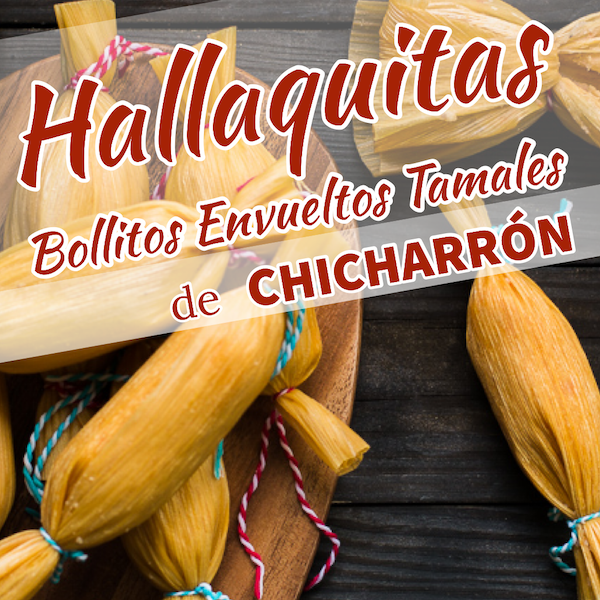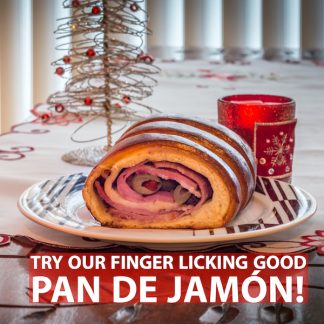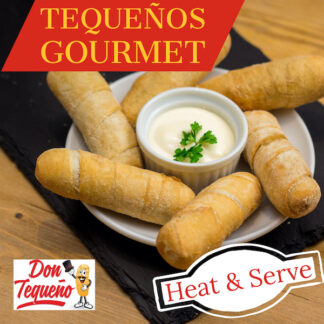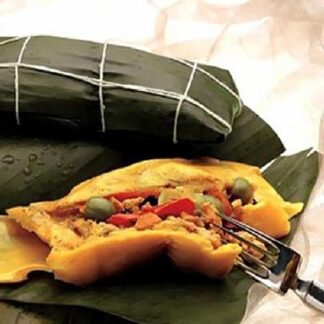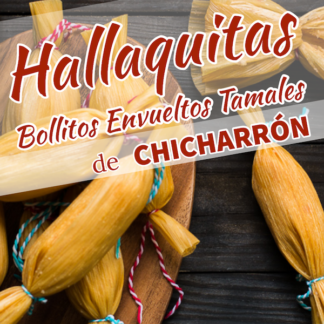Description
Hallaquitas de Chicharrón.
The name of Hallaquita comes from the similar leaf wrap of the Hallaca.
It´s a diminutive. However, the wrap is from corn husks instead of plantain
leaves and does not have any type of filling. A mixture of cornmeal dough
and vegetable oil or lard for softness is the base. The wrap must be done
from corn husks and the tie with strips from the corn husks is used to
hold it together while they settle. Finally, plenty of boiling water and cook
for about 20 or 25 minutes. Here are some definitions to avoid confusion:
Hallaquitas de chicharrón. Crushed pork rinds mix with the dough.
Seasoned Hallaquita. A sofrito (Hogao) The composition is tomato,
pepper, onion, and garlic all go in the mix along with the dough.
Sweetcorn Hallaquita. The dough is from young corn (the same dough
for making Cachapas.) Hence, the name “leaf cachapas,” or “cahapa de hoja.”
There is a very popular expression among Venezuelans that prays:
“She looks like a badly tied Hallaquita.” It tells that a woman dresses in clothing
a size smaller; therefore, she looks like an Hallaquita badly wrap.
This is a reality among Latin women.
You can also read the HIstory of the Hallacas.
Directions
MICROWAVE
1-Place the Hallaquitas, no more than 4 at a time,
on a microwave plate filled with hot water from the sink,
about half an inch.
Cover them with a damped paper towel to prevent
them from burning.
2-Cook on high for approximately 10 to 15 minutes
depending on the type of Microwave wattage until
thoroughly heated.
3-Repeat operation adding more minutes if necessary.
STOVE TOP
1-Place Hallaquitas in a saucepan and cover halfway with
water.
2- Cover pan, boil water, drop the tamales from frozen and
let them boil away for fifteen to twenty minutes.
Add more minutes if necessary.
Brief Story
Hallaquitas de Chicharrón.
In the book “The Orinoco illustrated and Defended”
by the Jesuit missionary Joseph Gumilla, there are
clues that can be tied to this delicious Latin American
treat, however, this is only a theory.
The amazing story narrates the marvelous findings
and impressions during the Evangelist’s mission
in Venezuela’s territory. Specifically in the Orinoco’s
River basin. Yet, it all occurred during the XVIII century.
The research is quite an accomplishment and a gem.
Though, it unveils the legendary wisdom of the
natives in their dominion. Nevertheless, the minister
witnesses a multitude of remedies, foods, customs,
and other traditions of the indigenous people.
Consequently, in chapter XX, “About the Indians and
the Main Fruits they Harvest.” There is an excerpt
which describes how from ground Corn and by
the force of the women’s arms, aboriginals make loaves,
wrap them in corn husks, cook them in boiling water
and not in fire pits as they often prepare meals.
As a result, a Cornbread indigenous call Caizú comes
out of the large pots they use to boil them.
It is what we today call Hallaquitas or Tamales.
Gumilla, Joseph. El Orinoco ilustrado y defendido: historia natural,
civil y geográfica de este gran río y de sus caudalosas vertientes:
http://www.memoriachilena.gob.cl/602/w3-article-10045.html
You may be interested in reading: HIstory of the Hallacas.

